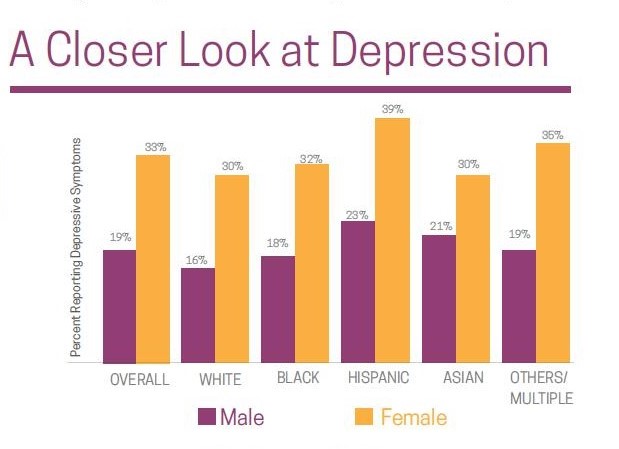Fairfax County Youth Survey Results and Depression

The Fairfax County Youth Survey is a comprehensive, anonymous, voluntary survey given yearly to 6th, 8th, 10th and 12th Grade students. A collaboration between the Fairfax County Government and Fairfax County Public Schools, it examines behaviors, experiences and other factors that influence the health and well-being of the County’s youth. Fall 2016 survey data on Depression appears above and below.
Thirty three percent of females reported depressive symptoms. Overall, 26 percent of students responded that they had experienced feeling so sad or hopeless almost every day for two weeks or more that they stopped doing some of their usual activities. Rates of depression increased with school grade level. While only 21 percent of Sixth Graders reported feeling depressed, 32 percent of high school Seniors did. Fairfax County youth who are depressed are more likely to skip school, to have used drugs or alcohol and to be sexually active and less likely to seek parental help for problems.
Thirty six percent of students reported high levels of daily stress. Substance use within the past 30 days greatly increased both rates of depression and the amount of stress for students as compared to those who had not used drugs or alcohol in the same time period.
Signs of depression include feeling like things will never get better; experiencing deep emotional pain (like something is wrong internally that cannot be fixed); being unusually angry; having your mind feel cloudy and finding it difficult to make decisions; excessive or inappropriate guilt; and not being about to concentrate on specific tasks or taking a lot of effort to do simple things.
If you are concerned about a friend or relative, ask him or her if he or she is okay and reflect on what he or she says, letting him or her know that he or she has been heard. Mental, emotional, and behavioral disorders are common and begin early in life. The greatest opportunity for prevention is among youth. Recognizing and responding to Depression can involve simple activities like realizing that with their limited life experience, youth may think that events like breaking up with a boyfriend or girlfriend or not making a sports team are devastating; keeping lines of communication open with your child; knowing his or her friends and involving yourself in school activities; and providing pleasant interactions and opportunities for success for your child.